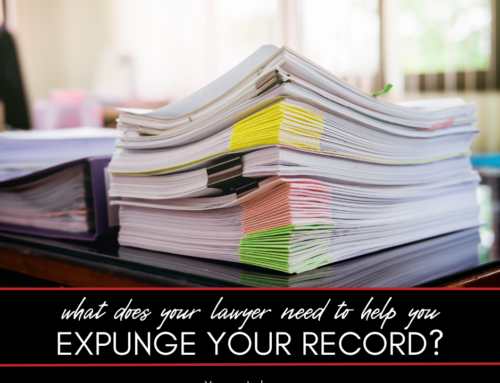
Your criminal record doesn’t have to define you for the rest of your life. That’s the basic premise behind Indiana’s expungement law – and you may be able to take advantage of it. This guide explains.
Expungement in Indiana: The Basics
The state of Indiana allows some people to get a fresh start through criminal record expungement. Expungement can do one of two things, depending on the nature of your case:
- It can seal your record from public view so that ordinary people can’t see it.
- It can keep your record visible to the public, but annotate it as expunged.
Expungement is a legal process, and it requires you to petition the court. In plain English, that means you need to ask a judge to clear your record, and there’s a procedure you must follow to do it. Because it can be tough to coordinate all the paperwork and file a petition with the court, many people choose to work with an Indiana expungement attorney to simplify the process.
Why Would You Want to Expunge Your Criminal Record?
Many employers conduct background screenings, as do many landlords and others. When you have a criminal record, it hangs over your head – and it could prevent you from finding a place to live or getting a job.
However, the Indiana Expungement Statute (IC-35-38-9-10(b)) says that if your record is expunged, it’s considered unlawful discrimination for any person to suspend, expel, refused to employ or refuse to admit you. It’s also against the law for someone to refuse to grant or renew a license, permit or certificate you need to engage in any activity, occupation or profession. The law includes one more stipulation: It’s unlawful to “otherwise discriminate against” a person whose record has been expunged or sealed.
Essentially, if your record is expunged, others – including landlords and employers – are required to treat you as if the offense never occurred. That’s why many people choose to petition the court for criminal record expungement in Indiana.
What Records Can You Expunge in Indiana?
Generally speaking, you can ask the court to expunge the following types of criminal records:
- Arrests and criminal charges
- Pretrial diversion records
- Some criminal convictions
- Delinquency adjudications
- Civil forfeitures
- Post-conviction proceedings
But not all records qualify for expungement in Indiana. In fact, some records remain forever – you can never erase them. You can’t expunge the following offenses from your record:
- Homicide, voluntary manslaughter or involuntary manslaughter
- Offenses that involve sex offender or violent offender status
- Convictions for two or more offenses that involved the use of a deadly weapon (provided that they didn’t stem from the same incident)
- Offenses related to official misconduct under Indiana Code § 35-44.1-1-1
Requirements to Expunge Your Records
Depending on the nature of your records, you must meet certain requirements in order to be eligible for expungement. The following table outlines the requirements for each type of offense.
| Type of Offense | Expungement Requirements You Must Meet |
| Arrests | The arrest must not have resulted in a conviction, or it must have resulted in a conviction that was vacated. You must not be currently participating in a pretrial diversion program. You must wait one year from your arrest. |
| Criminal charges | The charge or charges must not have resulted in a conviction; if you were convicted, the conviction must have been vacated. You must not be currently participating in a pretrial diversion program. One year must have passed. |
| Pretrial diversion | You must have successfully completed the pretrial diversion program, and one year must have passed. |
| Misdemeanors | You must have no criminal charges pending, and you must have paid all your fines, fees, court costs and restitution payments. Additionally, you must not have been convicted of a crime within the past five years, and five years must have passed from the date of the conviction you want to expunge. |
| Class D or Level 7 felonies | You must have no criminal charges pending, and you must be up to date on all your fines, court costs, fees and restitution payments. You must not have been convicted of a crime within the last eight years, and it must have been eight years from the date of the conviction for the offense you wish to expunge. |
| Nonviolent felonies | You must not have any criminal charges pending, and you must have already paid all your fines, restitution payments, fees and court costs. You must not have been convicted of a crime within the previous eight years, and it must have been eight years or more from the date of your original conviction. |
| Violent offenders and public officials | You must not have any criminal charges pending, and you must have satisfied all your obligations as far as fees, fines, restitution and court costs. You must not have been convicted of a crime within the past ten years, and it must have been 10 years from the date of your conviction. Additionally, the prosecutor must consent in writing to your expungement. |
Do You Have to Wait to Expunge Your Records in Indiana?
There’s a waiting period associated with any expungement in Indiana. The length of time you’re required to wait depends on the outcome of your case. If you were arrested and:
- never convicted, or if you were convicted but a judge later vacated your conviction, you must wait one year to file an expungement petition.
- convicted of a misdemeanor or a lower-level felony that was reduced to a misdemeanor, you must wait five years to file an expungement petition.
- convicted of a Class D or Level 6 felony, you must wait eight years to file an expungement petition.
- convicted of an eligible major felony, you must wait eight or more years following conviction, or three years from the date you completed your sentence (whichever is later) to file an expungement petition.
The following table gives you a quick look at these waiting periods.
| Nature of the Offense | Waiting Period |
| Arrests with no conviction | 1 year |
| Criminal charges with no conviction | 1 year |
| Juvenile delinquency adjudication | 1 year |
| Misdemeanors | 5 years |
| Lower-level felonies reduced to misdemeanors | 5 years |
| Class D felonies | 8 years |
| Level 6 felonies | 8 years |
| Eligible major felonies | 8 or more years, or 3 years after you complete your sentence |
If you’ve waited the required amount of time, you may file your petition. However, remember that your petition still needs to make its way through the court system. That can take anywhere from a month to six months (and longer in some cases). the amount of time it takes for your petition to make its way through the court system depends on several factors, including the caseloads of the court personnel working on your file.
Objections to Expungement Petitions in Indiana
Your expungement petition may run into some obstacles along the way. In fact, the prosecutor may file an objection to your petition. if that happens, you may be entitled to a hearing where you can explain your side of the story. Your Indiana expungement attorney can represent you at that hearing.
You Get ONE Shot at Expungement in Indiana
In the state of Indiana, you’re only allowed to expunge your criminal record one time – that’s it. You only get one second chance.
That doesn’t mean that you can only expunge one offense, though, or offenses in only one county. If you have records in more than one county, you can file petitions for all of them within 365 days of each other. For example, if you have a record in Marion County, a record in LaPorte County, and a record in Hamilton County, you can file petitions in each of them – as long as you file them all within a one-year period. That means if you file your first petition on January 1 of next year, you must file your last petition by December 31.
Do You Need to Talk to an Indiana Expungement and Sealing Attorney?
We know expungement in Indiana can be confusing and time-consuming. If you’re ready for a fresh start, we may be able to help. Call us at 317-647-5476 or fill out the form below for a free consultation on expungement. We’re here to answer your questions and get you the fresh start you deserve.













